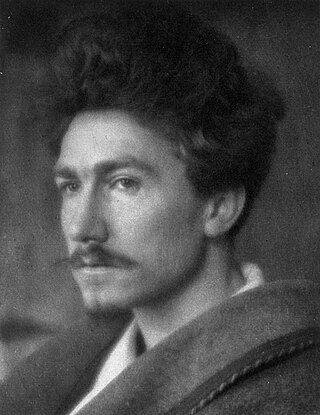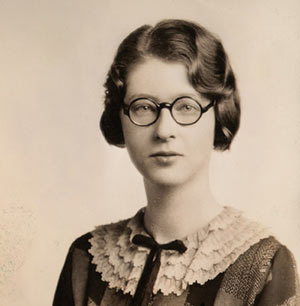
Free verse is an open form of poetry which does not use a prescribed or regular meter or rhyme and tends to follow the rhythm of natural or irregular speech. Free verse encompasses a large range of poetic form, and the distinction between free verse and other forms is often ambiguous.

William Carlos Williams was an American poet and physician of Latin American descent closely associated with modernism and imagism. His Spring and All (1923) was written in the wake of T. S. Eliot's The Waste Land (1922). In his five-volume poem Paterson (1946–1958), he took Paterson, New Jersey as "my 'case' to work up. It called for a poetry such as I did not know, it was my duty to discover or make such a context on the 'thought.'" Some of his best known poems, "This Is Just to Say" and "The Red Wheelbarrow", are reflections on the everyday. Other poems reflect the influence of the visual arts. He, in turn, influenced the visual arts; his poem "The Great Figure" inspired the painting I Saw the Figure 5 in Gold by Charles Demuth. Williams was awarded a posthumous Pulitzer Prize for Poetry for Pictures from Brueghel and Other Poems (1962).

Imagism was a movement in early-20th-century poetry that favored precision of imagery and clear, sharp language. It is considered to be the first organized modernist literary movement in the English language. Imagism has been termed "a succession of creative moments" rather than a continuous or sustained period of development. The French academic René Taupin remarked that "it is more accurate to consider Imagism not as a doctrine, nor even as a poetic school, but as the association of a few poets who were for a certain time in agreement on a small number of important principles".

Hilda Doolittle was an American modernist poet, novelist, and memoirist who wrote under the name H.D. throughout her life. Her career began in 1911 after she moved to London and co-founded the avant-garde Imagist group of poets with American expatriate poet and critic Ezra Pound. During this early period, her minimalist free verse poems depicting Classical motifs drew international attention. Eventually distancing herself from the Imagist movement, she experimented with a wider variety of forms, including fiction, memoir, and verse drama. Reflecting the trauma she experienced in London during the Blitz, H.D.'s poetic style from World War II until her death pivoted towards complex long poems on esoteric and pacifist themes.

Marianne Craig Moore was an American modernist poet, critic, translator, and editor. Her poetry is noted for its formal innovation, precise diction, irony, and wit. In 1968, she was nominated for the Nobel Prize in Literature by Nobel Committee member Erik Lindegren.

Modernist poetry in English started in the early years of the 20th century with the appearance of the Imagists. Like other modernists, Imagist poets wrote in reaction to the perceived excesses of Victorian poetry, and its emphasis on traditional formalism and ornate diction.
"In a Station of the Metro" is an Imagist poem by Ezra Pound published in April 1913 in the literary magazine Poetry. In the poem, Pound describes a moment in the underground metro station in Paris in 1912; he suggested that the faces of the individuals in the metro were best put into a poem not with a description but with an "equation". Because of the treatment of the subject's appearance by way of the poem's own visuality, it is considered a quintessential Imagist text.
The Objectivist poets were a loose-knit group of second-generation Modernists who emerged in the 1930s. They were mainly American and were influenced by, among others, Ezra Pound and William Carlos Williams. The basic tenets of objectivist poetics as defined by Louis Zukofsky were to treat the poem as an object, and to emphasize sincerity, intelligence, and the poet's ability to look clearly at the world. While the name of the group is similar to Ayn Rand's school of philosophy, the two movements are not affiliated.

Carl Rakosi was the last surviving member of the Objectivist poets, still publishing and performing poetry well into his 90s.

American poetry refers to the poetry of the United States. It arose first as efforts by American colonists to add their voices to English poetry in the 17th century, well before the constitutional unification of the Thirteen Colonies. Most of the early colonists' work was similar to contemporary English models of poetic form, diction, and theme. However, in the 19th century, an American idiom began to emerge. By the later part of that century, poets like Walt Whitman were winning an enthusiastic audience abroad and had joined the English-language avant-garde.

Thomas Ernest Hulme was an English critic and poet who, through his writings on art, literature and politics, had a notable influence upon modernism. He was an aesthetic philosopher and the 'father of imagism'.

Poetry has been published in Chicago since 1912. It is one of the leading monthly poetry journals in the English-speaking world. Founded by poet and arts columnist Harriet Monroe, who built it into an influential publication, it is now published by the Poetry Foundation. In 2007 the magazine had a circulation of 30,000, and printed 300 poems per year out of approximately 100,000 submissions. It is sometimes referred to as Poetry—Chicago.
Modernist poetry refers to poetry written between 1890 and 1950 in the tradition of modernist literature, but the dates of the term depend upon a number of factors, including the nation of origin, the particular school in question, and the biases of the critic setting the dates. The critic/poet C. H. Sisson observed in his essay Poetry and Sincerity that "Modernity has been going on for a long time. Not within living memory has there ever been a day when young writers were not coming up, in a threat of iconoclasm."

The Egoist was a London literary magazine published from 1914 to 1919, during which time it published important early modernist poetry and fiction. In its manifesto, it claimed to "recognise no taboos", and published a number of controversial works, such as parts of Ulysses. Today, it is considered "England's most important Modernist periodical."

Modernist literature originated in the late 19th and early 20th centuries, and is characterised by a self-conscious separation from traditional ways of writing in both poetry and prose fiction writing. Modernism experimented with literary form and expression, as exemplified by Ezra Pound's maxim to "Make it new." This literary movement was driven by a conscious desire to overturn traditional modes of representation and express the new sensibilities of the time. The immense human costs of the First World War saw the prevailing assumptions about society reassessed, and much modernist writing engages with the technological advances and societal changes of modernity moving into the 20th century. In Modernist Literature, Mary Ann Gillies notes that these literary themes share the "centrality of a conscious break with the past", one that "emerges as a complex response across continents and disciplines to a changing world".

Mary Ethel Barnard was an American poet, biographer and Greek-to-English translator. She is known for her elegant rendering of the works of Sappho, a translation which has never gone out of print.
Burton Norval Hatlen was an American literary scholar and professor at the University of Maine. Hatlen worked closely with Carroll F. Terrell, an Ezra Pound scholar and co-founder of the National Poetry Foundation, to build the Foundation into an internationally known institution.
Michael Heller, is an American poet, essayist and critic. Among his many books are Exigent Futures, In The Builded Place, Wordflow and Living Root: A Memoir. He wrote the libretto for the opera, Benjamin, based on the life of Walter Benjamin. He is recipient of awards including the NEH Poet/Scholar grant, New York Foundation for the Arts Fellowship (NYFA), National Endowment for the Humanities award, and The Fund for Poetry.
The Montreal Group, sometimes referred to as the McGill Group or McGill Movement, was a circle of Canadian modernist writers formed in the mid-1920s at McGill University in Montreal, Quebec. The Group included Leon Edel, John Glassco, A. M. Klein, Leo Kennedy, F. R. Scott, and A. J. M. Smith, most of whom attended McGill as undergraduates. The group championed the theory and practice of modernist poetry over the Victorian-style versification, exemplified by the Confederation Poets, that predominated in Canadian poetry at the time.

Reading Pound Reading: Modernism After Nietzsche is a 1987 book on Ezra Pound by the literary scholar and professor Kathryne V. Lindberg. Lindberg considers the influence of Nietzsche upon the prose criticism of Ezra Pound, including his essay "How to Read," his books The ABC of Reading and Guide to Kulchur, as well as in more ephemeral and fugitive sources such as newspapers and obscure literary journals.













